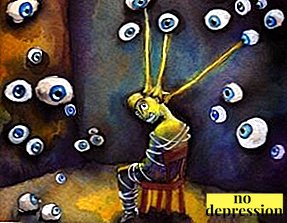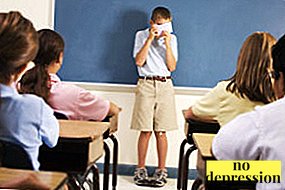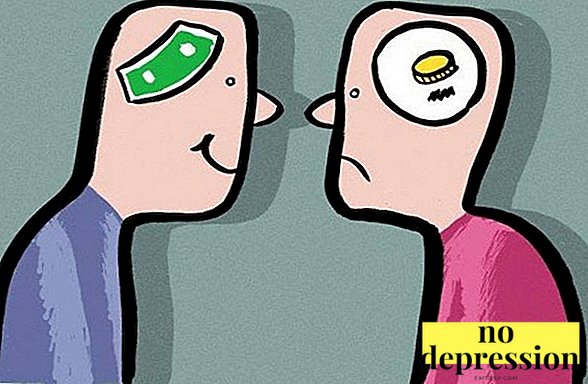Social phobia is one of the most common phobic disorders in psychiatric practice.
Sotsiofob - who is it? When this phobia occurs in humans, irrational fear of social actionimplying any kind of contact with society.
The quality of life of a social phobia is largely impaired. People with this diagnosis complicated to carry out professional activities, to apply their own skills and to be in society.
Social phobia is treatable, but prognoses are directly dependent on the timeliness and usefulness of therapy.
Concept

Social phobia is steady irrational fear repeatedly repeated in the event of certain social situations.
Representatives of male and female are equally at risk of developing a phobic state.
The first symptoms of fear of social life in most cases occur in adolescence. This feature is due to the emotional instability of this age category.
Features of social phobia:
- Symptoms of phobias can manifest suddenly and are accompanied by prolonged relapses.
- The risk of re-manifestation of the phobic state increases when a person gets into difficult life situations.
About what social phobia is, how does it manifest itself and how to beat it, you can find out from the video:
Characteristics of social phobia
The main distinguishing feature of a social phobia is social fear. It seems to a person that people around him see flaws in him, constantly evaluate his appearance and behavior.
 Such thoughts bring not only emotional discomfort, but also greatly underestimate self-esteem.
Such thoughts bring not only emotional discomfort, but also greatly underestimate self-esteem.
Sociofobes are critical to their appearance, pay attention only to own shortcomings.
For social phobia is characteristic the emergence of problems in the following social situations:
- public performance;
- communication with the authorities;
- meeting people;
- business negotiations;
- communication with people in general;
- eating food in public places;
- attending events involving crowds;
- being in stores and malls.
Is it a mental illness?
Social phobia is an independent disease and belongs to the category of mental disorders. Phobia closely interconnected with other psycho-emotional disabilities and can be both their cause and consequence.
Social phobia should definitely be treated. Otherwise risk of serious consequences. Sotsiofoby potentially prone to alcoholism, drug addiction, suicide and protracted depressive states.
The reasons

A distinctive feature of social phobia is the likelihood of latent development.
Discomfort with other people is temporary.
With the progression of phobias occur persistent mental abnormalities.
Numerous factors can provoke the initial manifestation of the phobic state and its further development, including experienced emotional turmoil, children's fears and nuances of the quality of life.
Provoke The development of social phobia can be the following factors:
- effects of depression and their tendency to occur;
- complications of generalized anxiety disorder;
- the presence of panic disorders and their progression;
- the consequences of situations that traumatize the psyche and are related to society;
- alcohol and drug abuse;
- development of obsessive-neurosis;
- social conflicts experienced at any age;
- genetic predisposition;
- constant psychological pressure from the authorities;
- ridicule and excessive criticism of the people around them;
- excessive parental care in childhood;
- education in too strict and demanding conditions.
Kinds

In psychiatric practice, there are two main types of social phobia - delineated and generalized form.
In the first case, anxiety arises in situations of the same type (for example, being in shopping centers, public speaking, conversations with superiors, etc.).
With a generalized phobia panic attacks manifest independently of the provoking factor. The boundaries of social phobia can constantly expand.
For example, if for a long time a person experienced fear only when personal communication was necessary, then a phobic state can gradually spread to telephone conversations.
What is the difference - a social phobia and a sociopath, an introvert, a misanthrope?
The unifying factor for social phobes, sociopaths, introverts and misanthropes is having a problem when dealing with society.
Otherwise, these definitions have nothing in common with each other and are forms of different deviations.
Social phobia is afraid of social situations and tries to avoid them by any means. Such a person does not try to change society, but avoids him.
Differences Misanthropes, introverts and sociopaths from social phobia:
- Sociopaths constitute a threat to society, their behavior is aggressive and immoral, directed against social foundations (such a deviation is a serious mental disorder).
 Misanthropes they are hostile to society, but do not create social danger (the feeling of hatred towards people gives them pleasure).
Misanthropes they are hostile to society, but do not create social danger (the feeling of hatred towards people gives them pleasure).- Introvert a person becomes against the background of a penchant for solitude or restriction of personal space (the social circle of such people is minimal, but they do not hate society, are not subjected to psycho-emotional upheavals and are not afraid of social situations).
How is a sociopath different from a social phobia? You can learn about who sociopaths are from the video:
Symptoms and signs
The main form of social phobia is occurrence of anxiety in social situations. Social fears cannot control their fears.
Panic attack is accompanied by physiological signs. The intensity of the symptoms depends on the degree of mental disorder.
Anxiety states can occur at the moment of exposure to a provoking factor or independently of it (for example, sleep disorder, constant emotional stress, feeling of spiritual "emptiness" or waiting for sad events).
When an annoying factor occurs, a social phobia has the following the symptoms:
 sensation of heat and chills;
sensation of heat and chills;- severe headaches and dizziness;
- difficulty in swallowing;
- general weakness of the body;
- feeling of trembling in the limbs;
- loss of balance;
- excessive sweating;
- increased heart rate;
- respiratory failure;
- weakness in the legs.
Characteristic manifestations in adolescents
Causes of social phobia in adolescents differ from the factors provoking this phobia in adulthood. During puberty, not only the character changes, but certain hormonal changes take place.
Adolescents are critical of their appearance, react painfully to ridicule of peers and are prone to the strongest psycho-emotional experiences, which are caused by exaggerated facts.
Special features teenage social phobia:
- If the phobia is not eliminated during adolescence, then a mental disorder can provoke serious mental illnesses.
- Social phobia can cause adolescent addiction to bad habits and suicide (instability of the psyche of this age group increases the degree of danger for them of this phobia).
Social phobia and the army - forecast

Presence of social phobia not a reason for denial of military service.
If there is suspicion of this phobia, the psychologist may order an additional examination of the recruit.
If he has associated mental illnesses, then he will need to undergo a special course of therapy. At the time of treatment from the army, the conscript gets deferment.
How to overcome fear?
How not to be a social phobia? In the most efficient way The fight against social phobia is a psychotherapeutic method. Experts identify the causes of phobias and select the best options to eliminate them.
If signs of mental disorder are noticed by social phobia in the early stages of development, then their further development can be prevented by a set of exercises that are performed at home. In the presence of persistent deviations use of drug therapy is inevitable.
Drugs and antidepressants
Can I cure ailment? The basis of drug therapy of social phobia is tranquilizers and antidepressants. The first type of drugs is needed for the rapid correction of psycho-emotional state.
Antidepressants have a complex effect on the body. On the one hand, such drugs reduce emotional stress and eliminate anxiety, on the other hand, they improve the general condition of the body, normalizing sleep and appetite.

In the treatment of social phobia are used the following drugs:
- serotonin-based antidepressants;
- heterocyclic antidepressants;
- norepinephrine preparations;
- medication of the agonist group;
- agents containing benzodiazepine.
Books
The topic of social phobia is dedicated to many literary publications. Some of them are devoted to identifying the causes of a phobic state, others to methods of dealing with mental disorder.
Such books help social phobia not only to realize the problem, but also to find its solutions. When choosing literary publications, preference is recommended to give preference to scientific sources compiled by qualified specialists.
Book examples on social phobia:
- J. U. Biik "Training to overcome social phobia";
- K. Topf "The art of casual conversation";
- D. Nardone "Fear, panic, phobia";
- V. Eltz "How to overcome fear and start living."
Psychology tips
Psychologists strongly recommend getting rid of social phobia. This mental disorder not a character trait.
If the problem is not eliminated at the first signs of its occurrence, then the consequences can not only change the quality of a person’s life, but also cause his death.
Social phobia is the most common reasons of suicide and propensity to alcoholism. Patients try to eliminate their fears by bad habits, and if there is no result, they fall into severe depressive states.
Recommendations psychologists:
 looking in the mirror, it is necessary to note the merits of your appearance and pronounce them out loud;
looking in the mirror, it is necessary to note the merits of your appearance and pronounce them out loud;- for the development of oratorical skills, it is necessary to read books aloud more often;
- communication skills with people can be mastered with the help of your own reflection in the mirror;
- close people should try to tell more often how your day was;
- a good way to fight social phobia is to train yourself to greet the staff;
- In no case can a phobia be ignored.
Exercises at home by yourself
How to deal with the problem? Independent attempts to get rid of social phobia are permissible in the presence of the first signs of the development of a phobic state or as an addition to the main therapy. Peculiar training recommended daily or even several times a day.
A prerequisite and factor that increases the effectiveness of treatment is regular involvement in social situations. If they are purposefully avoided, then the process of getting rid of phobias will be delayed.
Exercise examplesthat can be done at home:
- Mastering relaxation techniques (the technique involves learning muscle and emotional relaxation, mastered techniques help to normalize the state of mind and eliminate the signs of panic attacks when they first appear).
- You need to create a positive image of yourself and try to identify the maximum number of its merits.
- It is necessary to get rid of a phobia gradually (it is important to try to overcome fear from minimally disturbing situations).
- It is important to be more interested in the outside world (read educational literature, watch documentaries, etc.).
- In the presence of discomfort in communicating with other people, it is important to understand that a person cannot be liked by absolutely everyone (attention should be paid to people who are friendly).
How to get rid of social phobia? Tips in this video:
How to help a social phobia?
Plays an important role in the treatment of social phobia attitude to a social phobia of his close relatives and friends.
Proper tactics of behavior and communication with such a person can not only speed up the process of getting rid of the phobic state, but in some cases is a good means of eliminating the first signs of a phobia. If there is a social phobia in the immediate environment, then it can be helped in several ways.
Recommendations to help a social phobia:
- psychological support;
- regular conversations about daily affairs;
- respect for friendly intonation when communicating;
- human involvement in social life;
- use of the method of praise with positive results.
How to live with a phobia?

Social phobia reduces the quality of human life.
In the presence of such a phobia, problems arise not only in communication with other people, but also creating a family.
Social societies do not pose a threat to society, but living with such a diagnosis is extremely difficult.
The symptoms of the phobic state in no case cannot be ignored. In some cases, social phobia is manifested in a latent form, and its signs are exacerbated only when serious emotional turmoil occurs.
To make life easier and cope with social phobia in the following ways:
- regular intake of sedatives (consultation with a physician is necessary first);
- fears need to be aware of and try to identify their cause (the value of the provoking factor should be reduced);
- in the presence of persistent anxiety states associated with social situations, it is recommended to contact specialists.
Some symptoms of social phobia can be mistaken for a violation of the cardiovascular system or endocrine abnormalities. It is important to try identify provoking factors.
If anxiety and somatic symptoms occur at the time of social situations, it is recommended to be examined by a psychotherapist and a psychologist. Experts will determine the presence of phobias with the help of tests, and also give recommendations on how to fix the problem.
What if you are a social phobia? How to live with social phobia? Recommendations:

 Misanthropes they are hostile to society, but do not create social danger (the feeling of hatred towards people gives them pleasure).
Misanthropes they are hostile to society, but do not create social danger (the feeling of hatred towards people gives them pleasure). sensation of heat and chills;
sensation of heat and chills; looking in the mirror, it is necessary to note the merits of your appearance and pronounce them out loud;
looking in the mirror, it is necessary to note the merits of your appearance and pronounce them out loud;

